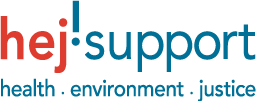
Chemicals in Products
TileHazardous chemicals in consumer products are posing an avoidable health risks to consumers, and to workers who are exposed to them within the supply chain, including waste handling. Chemicals of concern include toxic flame retardants, phthalates, vinyl chloride, dioxin, mercury, lead, pesticides and many other hazardous pollutants and known carcinogens, mutagens, reproductive and development toxicants and endocrine disrupting chemicals. HEJSupport Co-Director Olga Speranskaya is active in the steering committee of the SAICM chemicals in products programme and the UN Environemt 10 YFP on Sustainable Consumption and Production. Alexandra Caterbow, Co-Director of HEJSupport, is the NGO representative in the chemicals working group of the German Textile Alliance. HEJSupport advocates for toxic-free products, and the implementation of the right to know and the precautionary principle.
Subscription Chemicals in Products Newsletter
 Decoding Green Practices in Product Communication 07.03.2024 - In the presentation, HEJSupport explains what the Global Minimum Transparency System is and how it can help companies provide accurate information about chemicals in materials and products to different stakeholders. ... Read More
Decoding Green Practices in Product Communication 07.03.2024 - In the presentation, HEJSupport explains what the Global Minimum Transparency System is and how it can help companies provide accurate information about chemicals in materials and products to different stakeholders. ... Read More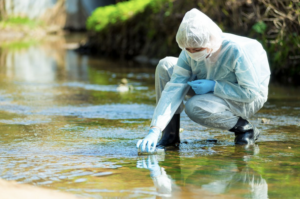 Sign the petition for a Toxic-free Europe now! 29.02.2024 - Join in and sign this important petition for a toxic-free Europe! ... Read More
Sign the petition for a Toxic-free Europe now! 29.02.2024 - Join in and sign this important petition for a toxic-free Europe! ... Read More Globally harmonized requirements for transparency and traceability of chemical information in plastic materials and products in the Plastic Treaty 30.05.2023 - A transparency mechanism, with a traceability requirement, will ensure that the disclosed information is linked to individual materials and products, and can be tracked throughout their life cycles. ... Read More
Globally harmonized requirements for transparency and traceability of chemical information in plastic materials and products in the Plastic Treaty 30.05.2023 - A transparency mechanism, with a traceability requirement, will ensure that the disclosed information is linked to individual materials and products, and can be tracked throughout their life cycles. ... Read More Potential options for elements towards an international legally binding instrument on plastic pollution 26.04.2023 - The new plastic treaty has a potential to become the first global agreement that includes harmonized legally binding transparency requirements for information on chemicals and polymers used in plastics. ... Read More
Potential options for elements towards an international legally binding instrument on plastic pollution 26.04.2023 - The new plastic treaty has a potential to become the first global agreement that includes harmonized legally binding transparency requirements for information on chemicals and polymers used in plastics. ... Read More Guidelines for Providing Product Sustainability Information 13.12.2022 - A global guidance on making effective environmental, social and economic claims to facilitate the empowerment of consumers ... Read More
Guidelines for Providing Product Sustainability Information 13.12.2022 - A global guidance on making effective environmental, social and economic claims to facilitate the empowerment of consumers ... Read More Canada’s voice: towards an ambitious new legally binding global agreement on plastic pollution 31.10.2022 - Canada's online survey about the global plastics treaty ... Read More
Canada’s voice: towards an ambitious new legally binding global agreement on plastic pollution 31.10.2022 - Canada's online survey about the global plastics treaty ... Read More Chemical transparency is an essential tool to increase the effectiveness of the Basel Convention 12.06.2022 - Chemical transparency is needed to ensure the effectiveness of the Basel Convention implementation. ... Read More
Chemical transparency is an essential tool to increase the effectiveness of the Basel Convention 12.06.2022 - Chemical transparency is needed to ensure the effectiveness of the Basel Convention implementation. ... Read More Global minimum transparency standard (GMTS) for hazardous chemicals in products – A tool for the protection of human health and the environment from toxic exposure 12.06.2022 - The GMTS is a step towards global safety of human health and the environment and stricter regulation or even a complete phase-out of hazardous chemicals. ... Read More
Global minimum transparency standard (GMTS) for hazardous chemicals in products – A tool for the protection of human health and the environment from toxic exposure 12.06.2022 - The GMTS is a step towards global safety of human health and the environment and stricter regulation or even a complete phase-out of hazardous chemicals. ... Read More Mandatory Transparency Standard for Chemicals in Plastic Materials and Waste 31.05.2022 - Including a mandatory transparency standard for the monomers used to formulate the plastics and the additives from the very beginning will pave the way to non-toxic circular economy. ... Read More
Mandatory Transparency Standard for Chemicals in Plastic Materials and Waste 31.05.2022 - Including a mandatory transparency standard for the monomers used to formulate the plastics and the additives from the very beginning will pave the way to non-toxic circular economy. ... Read More Plastic Treaty Coalition Discussed the Priority Themes for the Future Plastic Treaty 30.04.2022 - Adding the theme of transparency for plastic chemicals to the work of INC will facilitate its inclusion into the text of the future binding instrument on plastic. ... Read More
Plastic Treaty Coalition Discussed the Priority Themes for the Future Plastic Treaty 30.04.2022 - Adding the theme of transparency for plastic chemicals to the work of INC will facilitate its inclusion into the text of the future binding instrument on plastic. ... Read More Global Minimum Transparency Standard (GMTS) for hazardous chemicals in products – a tool for the protection of human health and the environment 14.03.2022 - GMTS is a keystone tool for achieving sustainable natural resource management and achieving the Sustainable Development Goals ... Read More
Global Minimum Transparency Standard (GMTS) for hazardous chemicals in products – a tool for the protection of human health and the environment 14.03.2022 - GMTS is a keystone tool for achieving sustainable natural resource management and achieving the Sustainable Development Goals ... Read More Join our hybrid UNEA Side Event: The Global Minimum Transparency Standard for hazardous chemicals in products 24.02.2022 - This side event introduces the concept of the Global Minimum Transparency Standard for Hazardous Chemicals in products. ... Read More
Join our hybrid UNEA Side Event: The Global Minimum Transparency Standard for hazardous chemicals in products 24.02.2022 - This side event introduces the concept of the Global Minimum Transparency Standard for Hazardous Chemicals in products. ... Read More Chemicals and waste issues at UNEA 5.2 08.02.2022 - Have a look at our submissions and recommendations on draft resolutions in the chemicals and waste cluster. ... Read More
Chemicals and waste issues at UNEA 5.2 08.02.2022 - Have a look at our submissions and recommendations on draft resolutions in the chemicals and waste cluster. ... Read More The PFAS problem, the ‘Forever Chemicals’, is not on the public radar in Canada. But it should be. 20.11.2021 - Most Canadians have no idea they probably have PFAS chemicals (Per- and Polyfluoroalkly Substances) in their bodies, nor understand how they got exposed. ... Read More
The PFAS problem, the ‘Forever Chemicals’, is not on the public radar in Canada. But it should be. 20.11.2021 - Most Canadians have no idea they probably have PFAS chemicals (Per- and Polyfluoroalkly Substances) in their bodies, nor understand how they got exposed. ... Read More Session on Global Minimum Transparency Standard at “Tomorrow without Toxics” Conference 19.11.2021 - HEJSupport jointly with SSNC and groundWork, is hosting a Session on the Global Minimum Transparency Standard (GMTS) at the "Tomorrow without Toxics" Conference. Please, join us on November 23 as 12 p.m. CET. ... Read More
Session on Global Minimum Transparency Standard at “Tomorrow without Toxics” Conference 19.11.2021 - HEJSupport jointly with SSNC and groundWork, is hosting a Session on the Global Minimum Transparency Standard (GMTS) at the "Tomorrow without Toxics" Conference. Please, join us on November 23 as 12 p.m. CET. ... Read More Toys should be fun and not toxic – Revision of the EU Toy Safety Directive 29.10.2021 - Read our submission to the EU Commission on the revision of the EU Toy Safety Directive. ... Read More
Toys should be fun and not toxic – Revision of the EU Toy Safety Directive 29.10.2021 - Read our submission to the EU Commission on the revision of the EU Toy Safety Directive. ... Read More NGOs urge Canada to complete the assessment of PFAS in one year 21.07.2021 - It is not sufficient to simply focus on data collection by expanding the monitoring of PFAS in the environment – the efforts on PFAS must include a roadmap to move to informed substitution and innovation with safer products and chemicals. ... Read More
NGOs urge Canada to complete the assessment of PFAS in one year 21.07.2021 - It is not sufficient to simply focus on data collection by expanding the monitoring of PFAS in the environment – the efforts on PFAS must include a roadmap to move to informed substitution and innovation with safer products and chemicals. ... Read More Chemicals in Products Community of Practice 2021: discussion on chemicals in toys 05.07.2021 - Toxic chemicals in toys can be released into the environment causing pollution and affecting health. Read more about challenges in disclosing chemicals of concern in toys and ways to improve transparency and regulations to ensure toys are safe for children and the environment. ... Read More
Chemicals in Products Community of Practice 2021: discussion on chemicals in toys 05.07.2021 - Toxic chemicals in toys can be released into the environment causing pollution and affecting health. Read more about challenges in disclosing chemicals of concern in toys and ways to improve transparency and regulations to ensure toys are safe for children and the environment. ... Read More Sustainable Fashion – everything you need to know about your clothes 01.07.2021 - HEJSupport new on-line information resource on sustainability related topics in the textile and fashion industry provides a platform for progressive voices willing to share their vision and ideas on different aspects of sustainability in the textile and garment industry. ... Read More
Sustainable Fashion – everything you need to know about your clothes 01.07.2021 - HEJSupport new on-line information resource on sustainability related topics in the textile and fashion industry provides a platform for progressive voices willing to share their vision and ideas on different aspects of sustainability in the textile and garment industry. ... Read More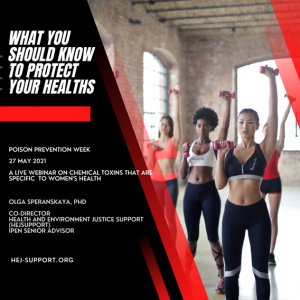 Changing the way we use chemicals: what women should know to protect themselves 19.06.2021 - In May 2021, HEJSupport was an invited scholar to speak at the Caribbean Poison Prevention Week webinar on "Gender and Chemicals". ... Read More
Changing the way we use chemicals: what women should know to protect themselves 19.06.2021 - In May 2021, HEJSupport was an invited scholar to speak at the Caribbean Poison Prevention Week webinar on "Gender and Chemicals". ... Read More NGO Comments on the draft of Canada’s Great Lakes Strategy for PFOS, PFOA and LC-PFCAs Risk Management 27.05.2021 - NGOs support the importance of implementing risk mitigation and management actions aimed at reducing PFAS chemicals in the Great Lakes waters, wildlife, and people. ... Read More
NGO Comments on the draft of Canada’s Great Lakes Strategy for PFOS, PFOA and LC-PFCAs Risk Management 27.05.2021 - NGOs support the importance of implementing risk mitigation and management actions aimed at reducing PFAS chemicals in the Great Lakes waters, wildlife, and people. ... Read More On-Line courses on SAICM in Russian 11.03.2021 - Since its adoption, SAICM has proved to be an important international framework for promoting and advancing chemical safety objectives. Learn more about its history, governance, and the process towards beyond 2020 chemical and waste strategy ... Read More
On-Line courses on SAICM in Russian 11.03.2021 - Since its adoption, SAICM has proved to be an important international framework for promoting and advancing chemical safety objectives. Learn more about its history, governance, and the process towards beyond 2020 chemical and waste strategy ... Read More Products in our home: a hidden health threat 02.03.2021 - Consumers deserve to be told the truth. There is a need for mandatory full disclosure of the presence of toxic substances in products ... Read More
Products in our home: a hidden health threat 02.03.2021 - Consumers deserve to be told the truth. There is a need for mandatory full disclosure of the presence of toxic substances in products ... Read More Why does the issue of e-waste continue to be a global challenge despite international efforts to address it? 18.02.2021 - An efficient e-waste management is based on government commitment; regulatory requirements and enforcement; a social orientation towards separate waste collection; and environment and health protection through safe toxic-free product design and transparency of chemical information. ... Read More
Why does the issue of e-waste continue to be a global challenge despite international efforts to address it? 18.02.2021 - An efficient e-waste management is based on government commitment; regulatory requirements and enforcement; a social orientation towards separate waste collection; and environment and health protection through safe toxic-free product design and transparency of chemical information. ... Read More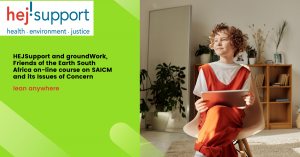 New on-line course on SAICM Issues of Concern 21.12.2020 - With this course we hope to expand the discussion about the future of SAICM beyond 2020 and involve many people and organizations from around the world into the conversation. ... Read More
New on-line course on SAICM Issues of Concern 21.12.2020 - With this course we hope to expand the discussion about the future of SAICM beyond 2020 and involve many people and organizations from around the world into the conversation. ... Read More NGOs call on Canada to eliminate all non-essential plastic products and materials 10.12.2020 - The NGO discussion paper recommends objectives to be included in the Canadian approach to plastic. ... Read More
NGOs call on Canada to eliminate all non-essential plastic products and materials 10.12.2020 - The NGO discussion paper recommends objectives to be included in the Canadian approach to plastic. ... Read More Toxic Additives in Plastics: Hidden Health Hazards Linked to Common Plastic Products 30.09.2020 - Even small amounts of toxic plastic chemical additives can result in cancers, damage to immune and reproductive systems, impaired intellectual functions, and/or developmental delays. ... Read More
Toxic Additives in Plastics: Hidden Health Hazards Linked to Common Plastic Products 30.09.2020 - Even small amounts of toxic plastic chemical additives can result in cancers, damage to immune and reproductive systems, impaired intellectual functions, and/or developmental delays. ... Read More ON-PACKAGE CONSUMER COMMUNICATION 28.09.2020 - Can I recycle this? A global mapping and assessment of standards, labels, and claims on plastic packaging ... Read More
ON-PACKAGE CONSUMER COMMUNICATION 28.09.2020 - Can I recycle this? A global mapping and assessment of standards, labels, and claims on plastic packaging ... Read More NGOs urge Canada to support other countries to stop toxic recycling 25.05.2020 - The impacts of PBDEs to health and the environment will continue to be of global concern with several Parties to the Stockholm Convention that have not withdrawn their need for the exemption. ... Read More
NGOs urge Canada to support other countries to stop toxic recycling 25.05.2020 - The impacts of PBDEs to health and the environment will continue to be of global concern with several Parties to the Stockholm Convention that have not withdrawn their need for the exemption. ... Read More NGO submission to UNEA5 presidency 13.05.2020 - The Norwegian presidency of UNEA5 asked stakeholders to provide input to specified questions on the ministerial declaration of UNEA5. HEJSupport, together with other NGOs, sent a joint submission to highlight a few key topics. ... Read More
NGO submission to UNEA5 presidency 13.05.2020 - The Norwegian presidency of UNEA5 asked stakeholders to provide input to specified questions on the ministerial declaration of UNEA5. HEJSupport, together with other NGOs, sent a joint submission to highlight a few key topics. ... Read More Canada responded to NGO request to stop the recycling of products with globally banned toxic flame retardants 30.04.2020 - Canada has no longer required the toxic recycling exemption for tetrabromodiphenyl ether, pentabromodiphenyl ether, hexabromodiphenyl ether, and heptabromodiphenyl ether listed in the Stockholm Convention on persistent organic pollutant. ... Read More
Canada responded to NGO request to stop the recycling of products with globally banned toxic flame retardants 30.04.2020 - Canada has no longer required the toxic recycling exemption for tetrabromodiphenyl ether, pentabromodiphenyl ether, hexabromodiphenyl ether, and heptabromodiphenyl ether listed in the Stockholm Convention on persistent organic pollutant. ... Read More NGO response to the Draft Science Assessment of Plastic Pollution 01.04.2020 - The Assessment confirms that larger plastic items like bags and straws can physically harm animals and negatively affect their habitat. The report also highlights microplastic pollution, noting evidence of negative effects on animals and the environment and uncertainties regarding the potential for effects on humans. ... Read More
NGO response to the Draft Science Assessment of Plastic Pollution 01.04.2020 - The Assessment confirms that larger plastic items like bags and straws can physically harm animals and negatively affect their habitat. The report also highlights microplastic pollution, noting evidence of negative effects on animals and the environment and uncertainties regarding the potential for effects on humans. ... Read More To Clean Up Canada’s Recycling Act, End a Zombie Chemical Policy 05.03.2020 - Recycled plastics can contain some of the world’s most hazardous chemicals. It is time we put an end to this toxic policy. ... Read More
To Clean Up Canada’s Recycling Act, End a Zombie Chemical Policy 05.03.2020 - Recycled plastics can contain some of the world’s most hazardous chemicals. It is time we put an end to this toxic policy. ... Read More Media Release: NGOs urge the Canadian government to stop the recycling of products with globally banned toxic flame retardants 29.01.2020 - Canadian groups seek greater protection to the environment and health. ... Read More
Media Release: NGOs urge the Canadian government to stop the recycling of products with globally banned toxic flame retardants 29.01.2020 - Canadian groups seek greater protection to the environment and health. ... Read More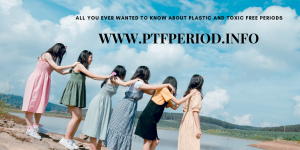 Webinar “Plastic- and Toxic-free Menstruation Products” 06.12.2019 - HEJSupport together with Women`s Voices for the Earth and Women Environmental Network hosted a webinar on plastic- and toxic-free menstruation products. You can find the presentations here. ... Read More
Webinar “Plastic- and Toxic-free Menstruation Products” 06.12.2019 - HEJSupport together with Women`s Voices for the Earth and Women Environmental Network hosted a webinar on plastic- and toxic-free menstruation products. You can find the presentations here. ... Read More What we need from a chemicals in products database 11.11.2019 - Consumers need clear, full, reliable and accessible information about chemicals in products. ... Read More
What we need from a chemicals in products database 11.11.2019 - Consumers need clear, full, reliable and accessible information about chemicals in products. ... Read More Publication: Guidance to the Chemicals in Products (CiP) Programme for NGOs 10.11.2019 - HEJSupport International coauthored "The Guidance to the Chemicals in Products Programme for non-governmental organizations". The Guidance explains the role NGOs should play in the implementation of the Programme which is the only international instrument that provides different options for disclosing information on hazardous chemicals in products. ... Read More
Publication: Guidance to the Chemicals in Products (CiP) Programme for NGOs 10.11.2019 - HEJSupport International coauthored "The Guidance to the Chemicals in Products Programme for non-governmental organizations". The Guidance explains the role NGOs should play in the implementation of the Programme which is the only international instrument that provides different options for disclosing information on hazardous chemicals in products. ... Read More Ban Lead in Paints 10.10.2019 - On the eve of the International Lead Poisoning Prevention Week of Action HEJSupport Co-Director Olga Speranskaya speaks about lead poisoning through paints in Europe. ... Read More
Ban Lead in Paints 10.10.2019 - On the eve of the International Lead Poisoning Prevention Week of Action HEJSupport Co-Director Olga Speranskaya speaks about lead poisoning through paints in Europe. ... Read More The Sustainability of Fashion: what role can consumers play? 19.06.2019 - Read our new article about sustainable textiles and the demand of consumers. The textiles industry is one of the largest industries in the world. Its supply-chain includes agriculture, manufacturing, processing, fabric care, use, recycling and disposal. Nearly all countries are involved in the textile industry though the actual involvement can vary from textile and product… ... Read More
The Sustainability of Fashion: what role can consumers play? 19.06.2019 - Read our new article about sustainable textiles and the demand of consumers. The textiles industry is one of the largest industries in the world. Its supply-chain includes agriculture, manufacturing, processing, fabric care, use, recycling and disposal. Nearly all countries are involved in the textile industry though the actual involvement can vary from textile and product… ... Read More Plastic and Toxic Free Period 26.04.2019 - HEJSupport is happy to announce a new project on toxic chemicals, health, and plastic pollution. The project entitled “Plastic and Toxic Free Period” is supported by Funding for Social Change Ltd and is part of a broad initiative on plastic and toxic free disposable and reusable menstrual products involving Women’s Voices for the Earth (WVE),… ... Read More
Plastic and Toxic Free Period 26.04.2019 - HEJSupport is happy to announce a new project on toxic chemicals, health, and plastic pollution. The project entitled “Plastic and Toxic Free Period” is supported by Funding for Social Change Ltd and is part of a broad initiative on plastic and toxic free disposable and reusable menstrual products involving Women’s Voices for the Earth (WVE),… ... Read More 27 NGOs urge EU member states to vote for health and environment protection 11.02.2019 - 27 national, European and international NGOs urge EU member states to take responsible decisions at the next REACH Committee Meeting that will take place on the 14 and 15 of February 2019. ... Read More
27 NGOs urge EU member states to vote for health and environment protection 11.02.2019 - 27 national, European and international NGOs urge EU member states to take responsible decisions at the next REACH Committee Meeting that will take place on the 14 and 15 of February 2019. ... Read More Welche Rolle spielt die Textilindustrie bei der Verschmutzung von Flüssen? 07.01.2019 - HEJSupport hat im letzten Rundbrief des Forums Umwelt und Entwicklung einen Artikel zum Thema Textilien und Flüsse veröffentlicht. Die globale Tex- tilindustrie ist eine der größten VerschmutzerInnen von Flüssen weltweit. ... Read More
Welche Rolle spielt die Textilindustrie bei der Verschmutzung von Flüssen? 07.01.2019 - HEJSupport hat im letzten Rundbrief des Forums Umwelt und Entwicklung einen Artikel zum Thema Textilien und Flüsse veröffentlicht. Die globale Tex- tilindustrie ist eine der größten VerschmutzerInnen von Flüssen weltweit. ... Read More Will EU MEPs allow the violation of the Stockholm Convention? 05.10.2018 - On Thursday, 4th of October 2018, HEJSupport and ten other NGOs sent a letter to the members of the Environment Committee of the European Parliament, expressing their concern about some of the proposed amendments and changes to the Regulation on Persistant Organic Pollutants (POPs). ... Read More
Will EU MEPs allow the violation of the Stockholm Convention? 05.10.2018 - On Thursday, 4th of October 2018, HEJSupport and ten other NGOs sent a letter to the members of the Environment Committee of the European Parliament, expressing their concern about some of the proposed amendments and changes to the Regulation on Persistant Organic Pollutants (POPs). ... Read More Three EECCA countries are taking steps forward to ban plastic products 04.10.2018 - In the last months three EECCA region countries, Georgia, Moldova and Kyrgyzstan, strive for regulations to ban plastic products. ... Read More
Three EECCA countries are taking steps forward to ban plastic products 04.10.2018 - In the last months three EECCA region countries, Georgia, Moldova and Kyrgyzstan, strive for regulations to ban plastic products. ... Read More Fragrance chemicals harm human health – consumer should know about them 26.09.2018 - Dozens sometimes even hundreds of chemicals can hide in beauty and personal care products that contain fragrance. HEJSuport joins Breast Cancer Prevention Partners and many more environmental and health organizations worldwide and calls for full fragrance ingredient disclosure so consumers can make safer, more informed purchases. ... Read More
Fragrance chemicals harm human health – consumer should know about them 26.09.2018 - Dozens sometimes even hundreds of chemicals can hide in beauty and personal care products that contain fragrance. HEJSuport joins Breast Cancer Prevention Partners and many more environmental and health organizations worldwide and calls for full fragrance ingredient disclosure so consumers can make safer, more informed purchases. ... Read More EU Parliament should vote against toxic recycling 12.09.2018 - On September 13, the European Parliament will decide whether recyclers in the EU will be able to trade waste containing chemicals that are banned in the virging materials. HEJSupport joins EEB in the demand to the European Parliament to end toxic recycling. ... Read More
EU Parliament should vote against toxic recycling 12.09.2018 - On September 13, the European Parliament will decide whether recyclers in the EU will be able to trade waste containing chemicals that are banned in the virging materials. HEJSupport joins EEB in the demand to the European Parliament to end toxic recycling. ... Read More New Article in HazMat Magazin: Recycling end-of-life materials may be perpetuating toxic chemicals in new products 09.05.2018 - HEJSupport International Co-Director Olga Speranskaya, together with a researcher from the Canadian Environmental Law Association and paralegal, Fe de Leon, recently co-published a paper with to bring public attention to toxic chemicals that appear in new products made out of recycled materials. The authors of the paper argue that many countries have made investments into… ... Read More
New Article in HazMat Magazin: Recycling end-of-life materials may be perpetuating toxic chemicals in new products 09.05.2018 - HEJSupport International Co-Director Olga Speranskaya, together with a researcher from the Canadian Environmental Law Association and paralegal, Fe de Leon, recently co-published a paper with to bring public attention to toxic chemicals that appear in new products made out of recycled materials. The authors of the paper argue that many countries have made investments into… ... Read More
